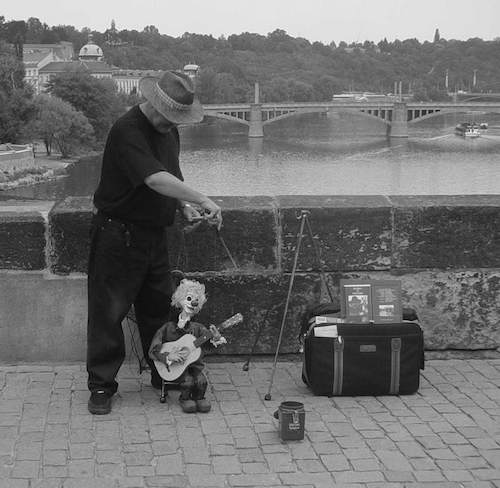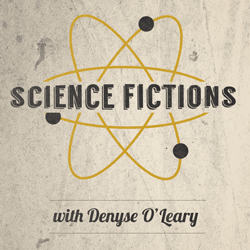 Culture & Ethics
Culture & Ethics
How Can We Believe in Naturalism if We Have No Choice?

There is no shortage of arguments against free will. So many thinkers say they could improve human nature if they could just force enough people to co-operate with their various programs.
New Scientist editor Graham Lawton, for one, puts the science case against free will in terms of physics:
We live in a deterministic universe. Given enough information about its present state, we could extrapolate to any past or future state with 100 per cent accuracy. Everything that has or will happen was determined at the big bang — and given that our brains are part of the physical universe, free will does not exist.
 Indeed, some are eager to embrace "neurolaw" and "neurojustice" — essentially, trendy "you are nothing but a pack of neurons" terms applied to criminal justice. Baylor neuroscientist David Eagleman asserts that, with respect to a defendant in a criminal case, there is "no meaningful distinction between his biology and his decision making."
Indeed, some are eager to embrace "neurolaw" and "neurojustice" — essentially, trendy "you are nothing but a pack of neurons" terms applied to criminal justice. Baylor neuroscientist David Eagleman asserts that, with respect to a defendant in a criminal case, there is "no meaningful distinction between his biology and his decision making."
How will that affect Constitutional guarantees? New Atheist neuroscientist Sam Harris is a help here. In The Moral Landscape: How Science Can Determine Human Values (2010), he tells us that, regarding concerns about self-incrimination, "the Fifth Amendment has already succumbed to advances in technology. … It is not at all clear that there is a distinction between these diverse sources of information that should be ethically or legally relevant to us." (p. 135)
Some go so far as to think that we are now less likely to believe that there is even a me left (that is, a mere "ghost in the machine," as English philosopher Gilbert Ryle put it).
But whose ghost? And whose machine?
Even some New Atheists like Daniel Dennett dissent from such a breezy dismissal of what so many have given their lives for. He points out that such a view "is blind to the chilling lessons of the not so distant past."
But Dennett hardly touches the key problem: If there is no free will, no moral arguments can be advanced against any behavior at all. If, as some contend, the whole idea of free will has been "programmed into our brains by evolution," criminal activity is mere predation.
Do cats "reform" their attitude to mice? Does anyone expect them to?
New atheists divide from traditional atheists (the latter do not believe in God but are not necessarily naturalists who believe that nature is all there is) on this matter. Raymond Tallis for example, an atheist neuroscientist and philosopher, has no use for these no-free-will theories. Nor does agnostic science writer John Horgan, who begged (2010), "Dear scientists, please stop bashing free will. … Science has discovered nothing that contradicts free will."
Indeed, science has not discovered any such thing. But politics certainly did.
So today, these New Atheist fashions wear thin. They are the stuff of utterly conventional puffs for recent books. The only really new event is this: The adults are now talking back. For a number of reasons:
— Quantum mechanics fatally undermines Lawton’s thesis. At its quantum level, the universe is determined only statistically, not completely. And the brain’s most basic level is a quantum system, involving the interchange of electrons. (One von Neumann model is offered here.) So free will can exist, though we do not at present know exactly how. As Economist editor Anthony Gottlieb observes, flickers of activity in the brain may even be the wrong place to look because "many of the distinctively human things that people do take place over time and outside their craniums."
— Popular no-free-will accounts typically lead to a deterioration in attitudes, which naturalists have been reluctant to confront. With good reason. For example, John Monterosso and Barry Schwartz warn against brain-based interpretations of human behavior because "less free will" explanations reduced volunteers’ sense of moral responsibility.
Quite apart from the true hidden costs of naturalism (nature is all there is) to society, a serious question arises: If a particular view of human nature consistently produces bad results among normal human beings, is that not evidence against its correctness? And if not, why not?
So the real news is quite the opposite from these proclamations: The idea of free will — we cannot choose what we experience but can choose how we react — persists. It is even resurgent. Just for example, physicist George Ellis recently defended philosophy and free will (life is top down, not bottom up). And even more recently, he warned against the multiverse as possibly the most dangerous idea in physics, because it is accepted without evidence, to plug a gap in naturalist thinking.
Similarly, Cal State’s Mark Balaguer‘s new entry Free Will concludes that the anti-free-will arguments put forward by philosophers, psychologists, and neuroscientists simply don’t work as hoped.
— Evolution is not the issue here. Predictably one social psychologist, Roy Baumeister, not able to deny free will, offers to tell us how free will evolved" (which, for his Real Clear Science readers, is apparently the critical part):
There is no need to insist that free will is some kind of magical violation of causality. Free will is just another kind of cause.
Hey, wait a minute. That free will is a kind of cause is a proposition no one has ever doubted. But Baumeister sheds no light on how it comes to exist.
— Claims about lack of understanding or control are often exaggerated, possibly for effect. In the Financial Times, Julian Baggini points out, "We may not have as much conscious control over our actions as we think we do, but people who deny we have any at all have simply drawn the wrong lessons from neuroscience." Today, even the famous 1983 Libet experiment, once generally taken to demonstrate that there is no free will (because brain signals for action start before you are conscious of them), is now questioned in follow-up research. There is also the dramatic case of neuroscientist James Fallon. Reviewing brain scans of murderers, schizophrenics, and depressives, he came across one that was "obviously pathological," which turned out to be his own, and he then revised his opinions.
— Neuropsychiatrist Jeffrey Schwartz, author of The Mind and the Brain, points out pragmatically that whether or not we have free will, in some sense, we do have "free won’t". In the most serious situations we face, that is perhaps the quality that matters most. We can decide not to do things we know are wrong or harmful. But the career stakes for advocating that seemingly obvious position are high.
— Some experts who are not strongly associated with a religious tradition have weighed in, one being psychiatrist Sally Satel. She especially targets studies that aim to prove that we are all helpless against the lure of fast food. She thinks reason exists; uncontrollable brain circuits don’t just somehow take over. It could matter. "Evil snacks" studies are, of course, welcomed by bureaucrats who are looking for an excuse to police food, but it’s not clear that they contribute much to science as such.
— Some, of course, try frantically to rescue free will but still keep naturalism. For example, neuroscientist Eddy Nahmias argues, "A more complete scientific theory of the mind will have to explain how consciousness and rationality work, rather than explaining them away," but he proposes to explain them in naturalist terms. Or, more dubiously, free will may still be allowed — as a user illusion. Neuroleadership Institute’s David Rock argues:
It appears that a belief in free will may make people smarter, better at learning, better on the job, more ethical and more helpful to others. If more people believed in free will it appears the world would be a better place. So maybe we should be putting more energy into a question of greater utility than whether free will is "real" or not, and trying to work out how to get more people to believe in free will?
Few readers will expect much success. Perhaps one should put more effort into explaining how Neuroleadership’s job came to be issuing counterfeit currency for naturalism — persuading people to believe in a currency that is backed by nothing at all.
— Even naturalists cannot take their own view seriously for long. Matthew Lieberman openly admits that his own materialist position is — a leap of faith:
I am a neuroscientist and so 99 percent of the time I behave like a materialist, acknowledging that the mind is real but fully dependent on the brain. But we don’t actually know this. We really don’t. We assume our sense of will is a causal result of the neurochemical processes in our brain, but this is a leap of faith. Perhaps the brain is something like a complex radio receiver that integrates consciousness signals that float around in some form. Perhaps one part of visual cortex is important for decoding the bandwidth that contains motion consciousness and another part of the brain is critical to decoding the bandwith that contains our will. So damage to brain regions may alter our ability to express certain kinds of conscious experience rather than being the causal source of consciousness itself.
I don’t actually believe the radio metaphor of the brain, but I think something like it could account for all of our findings. Its unfalsifiable which is a big no-no in science. But so is the materialist view — its also unfalsifiable.
If the materialist view is unfalsifiable, we cannot falsify it. But we can certainly look elsewhere for insight. And, as it turns out, "I will" means something after all
Editor’s note: Here is the "Science Fictions" series (the human mind) to date at your fingertips.
Image by User Chmouel on en.wikipedia (Own work) [GFDL or CC-BY-SA-3.0], via Wikimedia Commons.
